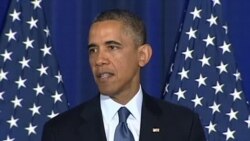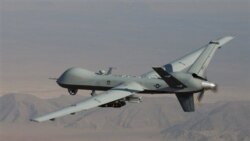THE WHITE HOUSE —
Related video report by Luis Ramirez
In a major address at the National Defense University in Washington, U.S. President Barack Obama has given a framework for ongoing counterterrorism efforts, including the use of drones in direct lethal action against terrorists.
The hourlong speech was Mr. Obama's most expansive effort yet to define threats that al-Qaida and "associated forces" pose to the United States, define how the U.S. responds, and outline limitations on such action.
Related video report by Luis Ramirez
As the U.S. ends its military involvement in Afghanistan, he said al-Qaida's "core" in Afghanistan and Pakistan is "on a path to defeat." He said there have been no large-scale attacks on the United States.
Obama said other threats have emerged, including al-Qaida in the Arabian Peninsula (AQAP), along with other localized groups, and radicalized individuals in the U.S.
Obama said the U.S. prefers to help build the capacity of partners such as Pakistan, Yemen and Somalia to act against extremist networks.
He said that when governments cannot stop terrorism on their territory, lethal targeted action, including with drones, is required, but must be held to rigorous standards.
"America does not take strikes when we have the ability to capture individual terrorists - our preference is always to detain, interrogate, and prosecute them. America cannot take strikes wherever we choose - our actions are bound by consultations with partners, and respect for state sovereignty," he sid.
Obama called the use of drones effective, saying they have disrupted many plots, and that they are legal, noting America was attacked on September 11, 2001.
But he acknowledged that the new technology raises "profound questions" and the risk of "creating new enemies."
"As our fight enters a new phase, America’s legitimate claim of self-defense cannot be the end of the discussion. To say a military tactic is legal, or even effective, is not to say it is wise or moral in every instance. For the same human progress that gives us the technology to strike half a world away also demands the discipline to constrain that power - or risk abusing it," he said.
Obama also spoke about the legality of targeting Anwar al-Awlaki, an American citizen and radical Muslim cleric who was among four Americans killed by drones since 2009.
"When a U.S. citizen goes abroad to wage war against America - and is actively plotting to kill U.S. citizens, and when neither the United States, nor our partners are in a position to capture him before he carries out a plot - his citizenship should no more serve as a shield than a sniper shooting down on an innocent crowd should be protected from a swat team," he said.
Obama did not announce any steps to transfer additional authority for drone operations from the CIA to the Defense Department. But a policy document he signed expresses a preference that the U.S. military has a lead role in the use of force "outside of war zones."
Professor Ken Anderson, from American University Washington College of Law, says the speech, which also covered detention policies, probably achieved a key objective.
"I think that it represented an understanding by the Obama administration in its second term that it has to reach out to Congress on a wide variety of issues that range from Guantanamo to drone strikes to other things, and that it needs to find ways in which to institutionalize and make an acceptable part of the permanent national security tool set of the United States, not just for this president but into the future," he said.
President Obama said the U.S. must define counterterrorism efforts not as a boundless global war on terror but rather as a series of persistent, targeted efforts to dismantle specific extremist networks.
The president plans to re-engage with Congress on drone policy. He ordered a review of proposals such as establishing a special court to evaluate and authorize lethal action.
He also wants the congressional Authorization for Use of Military Force, (AUMF) that Congress approved after the September 11, 2001 al-Qaida attacks, to be refined, and ultimately repealed. He said the U.S. must "discipline" its thinking so it is not drawn into more wars it does not need to fight.







